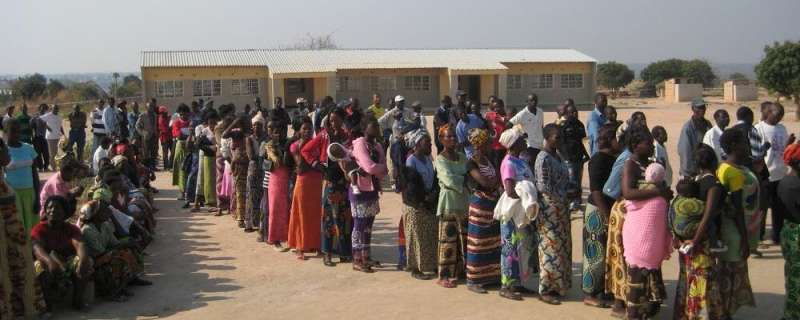Poor people's willingness to vote is affected by the local community

Poor individuals are more affected by the local community than others. They rely more on their local networks and show higher levels of solidarity with their neighbors. If voting is the social norm in the community, then the chances are higher that a poor person will vote. This means that the political participation of the poor varies depending on the social ties in the community, a dissertation from the University of Gothenburg shows.
The well-established literature on political participation understands differences in political engagement mostly as an outcome of individual characteristics. For example that resources such as time, money and civic skills explain political behavior. Yet, this still does not explain subnational variation in the engagement of the poor as those who typically lack these resources.
Earlier research also emphasizes that individuals do not act in isolation from their social environment but are affected by the people around them. In more recent years, social network research found that, in particular, family, peer and elite ties affect voting and other forms of participation. Yet, how social networks and the ties between community members differ among poor communities is still not well understood.
Social norms and community ties are important irrespective of the country context
In her dissertation project Prisca Jöst investigates when economically poor individuals do participate in political actions and why. The dissertation is dealing with these questions by looking at different country contexts, namely Tunisia, the UK and Sub-Saharan Africa (Kenya, Malawi and Zambia). Even though these are arguably very different contexts when it comes to their historical and cultural context, there seems to be something about the importance of social norms and community ties for the poor that is irrespective of the country context.
"My results show that the poor typically rely more on their local networks and therefore, are more prone to social monitoring from the community. They also show higher levels of solidarity with their neighbors and are more likely to bandwagon with their neighbors. This dependence on the local environment and other community members, in particular, increases the poor's willingness to engage in socially based modes of local participation when asked by community members or to vote when voting is perceived as a community norm."
A need to draw a more nuanced picture of the political behavior of the poor
The dissertation further contributes to the understanding of the rise of anti-establishment movements as it shows that similar mechanisms may cause engagement in modes of participation that are more desirable in a democratic system and those that are directed against the establishment.
Though this seem to be contradictory at first, strong social ties combined with individual frustration and the sentiment of being excluded from the political system can result in the mobilization of those who feel excluded. Populist rhetoric dividing societies in them, "the elite," versus us, "the people," may be appealing, in particular, to those in need. However, this is not to say that the poor are generally more likely to support populist parties or engage in violent protests.
"Especially when living in socially dense communities, poor people often behave more pro-social and are also more willing to engage in community programs and to support others. My dissertation shows that social norms and ties can positively affect engagement in what we consider to be desirable modes of engagement, yet, it could also lead to disruptive behavior when people perceive that their voices are not heard through the existing channels of political participation."
This highlights the importance of the political inclusion of all social classes in established as well as young democracies. It also emphasizes a need to draw a more nuanced picture of the political behavior of the poor than previous research has done.
How should we understand who is poor?
The dissertation also draws into question how we should understand who is poor and what follows from economic deprivation. For example, in a case of Tunisia, young and well-educated unemployed citizens are increasingly experiencing frustration due to lacking job and life opportunities. So, even though they have obtained a high level of education and are typically not categorized as socioeconomically deprived, they still must be considered as economically deprived. This contradicts our understanding of poverty and the people we would typically consider as being poor.
In her first study Prisca Jöst combines qualitative and quantitative evidence. She has conducted semi-structured interviews with political activists and civil society organizations during fieldwork in Tunisia in 2018 and relies on protest event data from the Armed Conflict and Event database. She also uses data from the Understanding Society dataset on the UK from the University of Essex and the Index of Multiple Deprivation for the second paper of the dissertation. The third paper that is included in her dissertation is co-authored with Ellen Lust, director of The Program on Governance and Local Development (GLD) at the University of Gothenburg. The study relies on data from GLD. Together with the GLD team, Prisca Jöst has conducted household surveys in Kenya, Malawi and Zambia in 2019. The surveys also included a conjoint experiment.
More information: The Political Participation of the Poor: Local Social Context and the Impact of Social Ties on the Political Engagement of Poor Individuals. hdl.handle.net/2077/68338
Provided by University of Gothenburg




















